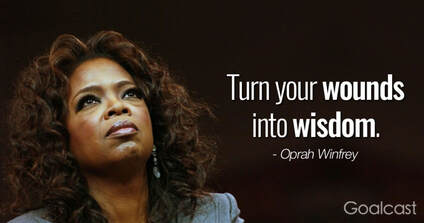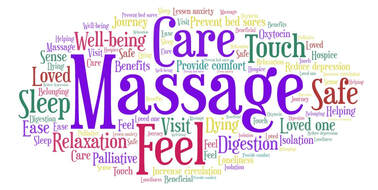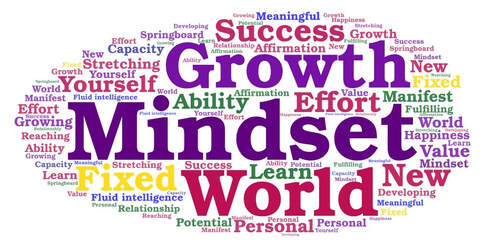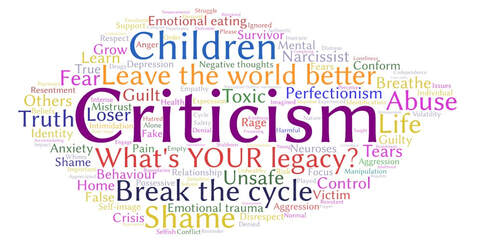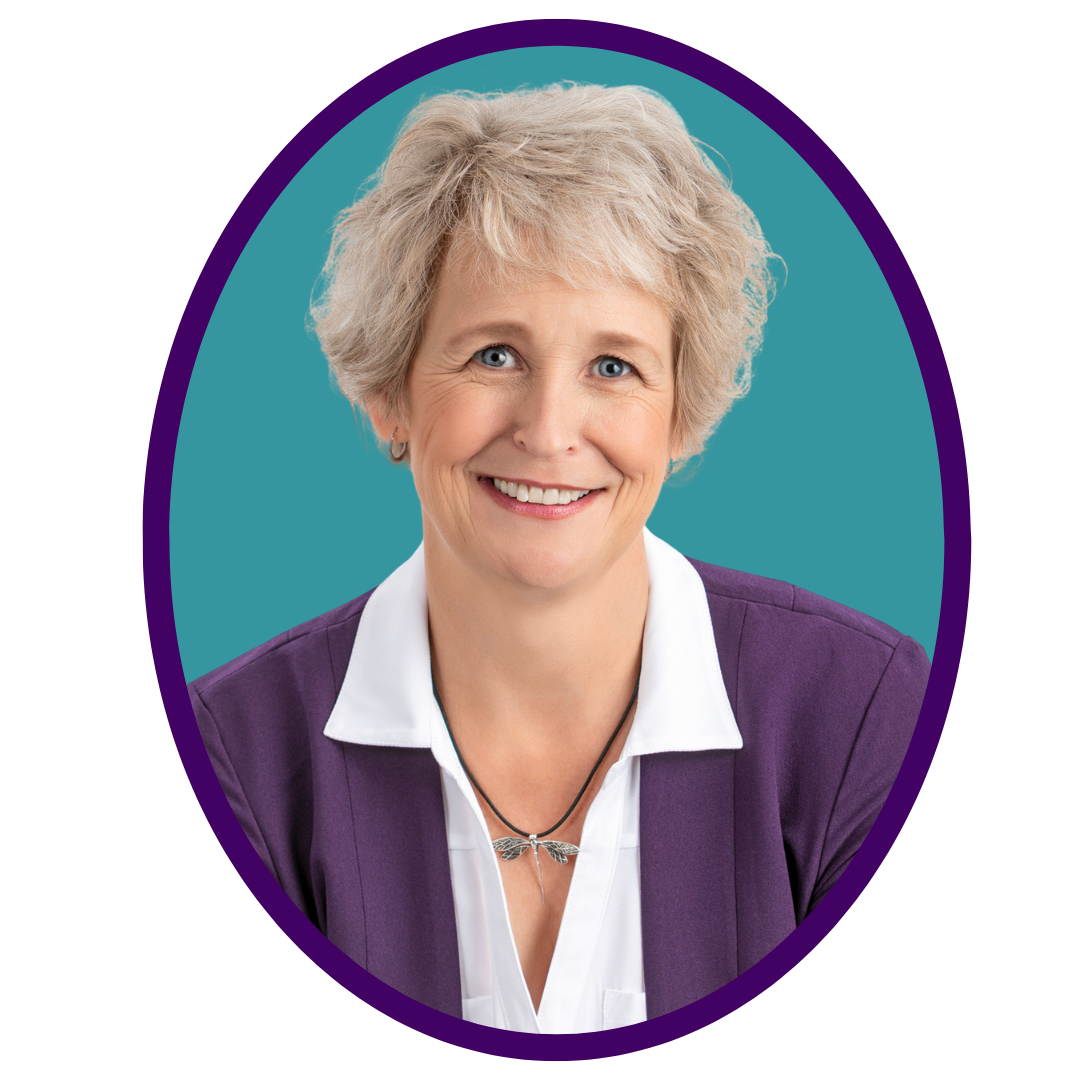|
Can you believe that I got to see Oprah last week?! Oprah Freakin' Winfrey, live and in person, just me and eighteen thousand of my closest friends. There I was, third row, stage right, so close I could count the diamonds in her stunning bracelet. And, girl, I have no idea how she walked in those shoes! I had a number of takeaways from her show - many of which I will milk in the weeks to come :) - but the one I am leading off with is the woman herself. What an incredible story is her life. I have written before about the voices, those, uh, unhelpful ones in your head telling you're not good enough or that you're stupid or, my favourite, asking, "What is wrong with you?”. Well, Oprah has had a good, guiding voice in her head since she was four. Her grandmother was hanging out the laundry one morning and said to the wee child, "Some day you'll be a maid just like me and Momma." Little Voice in Oprah's head declared, "Hell, naw! I will not!" I might be paraphrasing, but you get the point. The girl was driven. But the little voice - the Universe, the Holy Spirit, whatever your beliefs - wasn't always guiding her. The product of a brief relationship, Oprah was born to a teenage mother. She was raised by her maternal grandmother in rural Mississippi for the first six years of her life before being sent to Milwaukee to live with a mother she didn't know. Sexually abused and an outcast within her own family, Oprah was forever getting in and out of trouble. She went to spend a couple of years with her father in Nashville then went back to Milwaukee where things didn't get better. She was sent back to her father, pregnant and looking down the barrel of a miserable, sadly predictable life. The baby was born prematurely and died, which she and her father took as a sign to turn her life around. She was firmly back at school, on the honour roll, no less, and then off to university. “I started acting out my need for attention, my need to be loved,” Oprah told the Washington Post about her childhood with her mom. “My mother didn’t have the time. She worked every day as a maid. … I was smart and my mother, because she didn’t have the time for me, I think, tried to stifle it.” When her father took her in, she said, “it changed the course of my life. He saved me. He simply knew what he wanted and expected. He would take nothing less.” Her mother was not to be heard from again until Oprah became, well, OPRAH. The legacy coach in me just wants to unite Little Oprah with the woman she was going to become and to help them find compassion and healing with their mother, but our Oprah managed to do it without my help (prob'ly had a team team of coaches) and, in so doing, became mother to many. Twenty-five years. The show began in 1986. I was nineteen years-old and not particularly looking for a mother-figure, but I sit here now wishing she could be my best friend. I'll have to settle for following her lead and spreading some light where I can. In its original incarnation, the Oprah Winfrey Show was criticised by some for its sensationalist format. At some point in the 90s Oprah had Gary Zukav, author of The Seat of the Soul, on her show and she had her own come to Jesus moment. Gary, who was an onstage guest of Oprah's last week, was speaking to a couple who had had twin sons, one of whom died in infancy (I believe). Any accomplishment of the surviving twin was brutally painful for his mother who could only see what she had lost. As you can imagine, that would be very damaging to the living twin. "I do something good, and I hurt Mummy." Gary shifted the mother's way of thinking. "Try not to look at (I think his name was) Ryan as just your son; he was a small soul who came to you to learn something, to teach you something, and he did that. He came here and did what he needed to do, and then he was off onto his next mission, his next adventure." From that day forward, the mother could think of Ryan without despair, and the brother was free to live his best life. And, more importantly for us, Oprah's show changed, as did the woman herself. She had built the show. She had built her brand. She had built her platform. She had built her bank account! And good for her. She knew she would need every bit of that influence to wake up the world, her ultimate goal. She came to understand that that was what she had been working so hard toward, that which Little Voice needed from her. Tabloid talk show gave way to meaningful conversations. Her producers were not allowed to pitch anything unless it spoke to them on a deeper level. Or was Brad Pitt. Oprah's nobody's fool. The Oprah Winfrey Leadership Academy for Girls, a boarding school for girls, grades 8-12, opened in Henley on Klip, Gauteng Province, South Africa in 2007. According to the website, "We support the development of a new generation of women leaders who, by virtue of their education and service, will lead the charge to transform themselves, their communities, and the larger world around them. This goal adheres to the Academy’s principles of Ubuntu, which encompass the ideals of humanity, compassion and service to others. The spirit of Ubuntu permeates the Academy and is central to the way in which students think, speak, act and interact with others." They call her Mom O and she calls them her girls. Childless, Oprah Gail Winfrey continues to leave her legacy in the world. She teaches us resilience, the importance of forgiveness, compassion, and connection. Before she exited the stage, though, Oprah reminded us all that, while education is important (and in some circumstances, almost unheard of for young women), the greater priority is healing. For them. For all of us. When does the idea of legacy pop up in a person's life? Put another way, who are the people whom I serve? I get the greatest results working with people who are facing the transition of someone arriving in or leaving this world.
The next generation is on its way! I know you want to do your best by them. Leave the world better. Author
0 Comments
This blog shouldn’t even need to be written, but here I am reminding us all that touch is the most important sense that the human animal possesses. You might think that that’s craziness, right? I mean, seeing or hearing someone or something committed to doing you harm must be more important, no? What about smelling gas or a burning fire? I could argue that never tasting a perfectly grilled rib steak again would be a tragedy of the highest priority. But touch is the only sense the absence of which can actually kill a person. This issue hit me very hard this week when I saw footage of a man, Scott Dittman, at the Pittsburgh Pride Parade giving out Dad Hugs to the queer community members who had been disowned and/or kicked out of their homes just for being who they are. I saw grown men and women clinging to him, tears streaming down their faces as they grieved the intimacy they’d lost with their own parents. My other impetus for writing on this topic is the fact that there are still children at the U.S./Mexico border being separated from their parents, detained in cages, and dying at a rate of one a month. A teenage mother healing from a caesarian and her preemie were left completely neglected at a border patrol facility for over a week. Touch is the gateway to compassion. Human touch is so important to us that infants deprived of all but the most perfunctory of it will often show signs of aggression, anxiety, and/or depression. What’s worse, babies who are not held and nuzzled and hugged enough will literally stop growing and, if the situation lasts long enough, even if they are receiving proper nutrition, die. There was a time when orphanages’ infant mortality rates were above 30%. In adulthood the children who had been touch-deprived will likely have issues with trust and attachment. They will learn to self-soothe, turning to alcohol or drugs, binge-eating, binge-watching, or binge-Facebooking. There is often an underlying loneliness even inside of a good relationship. (Damn, this has gotten bleak. Time to reel it back in.) There is good news in all of this! First, the damage caused to many of those children can be reversed, and second, we have learned the value of touch for our species. And its value doesn’t diminish over time. We need human contact up until our last breaths and perhaps beyond, when our souls vacate their human bodies. Aaaaand we’re back to dying. Please pay attention, because this really matters. Too many of us forget to touch our dying loved ones for fear that we will hurt them somehow. I’m going to say this loudly, so the people at the back can hear me: You hurt your dying loved one more by not touching them than you do by touching them. Physical touch causes dopamine and serotonin – the body’s antidepressants – to be released by the brain. Further, it suppresses cortisol and, with it, anxiety and stress. Physical touch has tremendous effects on the body’s parasympathetic nervous system. It lowers blood pressure and breathing and heart rates. Gentle massage increases circulation and prevents bed sores. It can reduce the experience of pain. It might be the last form of communication available with a person who is dying, telling the recipient in no uncertain terms that they are loved, that they are safe. And isn’t that ultimately what each of us is looking for? Leave the world better Can you believe I’ve been a massage therapist for twenty-two years? Yes, I was a toddler when I started. 😊 I am so grateful to the clients I have had the great honour to serve, none more so than the ones who were facing end-of-life. Call me if you would like to learn how to best massage a loved one who is in palliative (or memory) care. I will show you how to work around tumour sites, how to roll your loved one to better access their back, and how to massage them in such a way as to not hurt yourself. Up to three people can be included in the training. http://www.violetlight.ca/programs.html AuthorChristie Morden is Calgary's premiere legacy coach. She is dedicated to helping families break the cycle of intergenerational emotional trauma. I started a new book last week, Mindset: The New Psychology of Success by Carol S. Dweck, PhD. Mindset. That's one of the new It words these days, isn't it? It's up there with Abundance, Snowflake, and Kale. Mindset seems to be the theme for most of my readings/musings of late. I did a group hypnosis session last month about a prosperity mindset. T. Harv Eker keeps screaming at me to have a Warrior Mindset. And now, here's Dr. Dweck differentiating the growth from the fixed mindset. I have noticed some universal takeaways. Let me illustrate with a story I assume will resonate with a lot of you. When I was at school, we used to write our exams in the gym. Rows upon rows of desks and chairs. The scent of fear and I'll shower later was heavy in the air. "You may turn over your exams," the teacher would proclaim. Heads down, pencils up! I would work diligently, really getting into my groove, right up until such a time as the teacher would start to do her rounds. I'd stare down at my paper but be watching her, scarcely blinking and really honing my peripheral vision skills. My blood pressure would slowly creep up to the point where I'd almost stroke out as she came up behind me. My breathing would get shallow. I would completely stop writing. All I could do was sit there and wait for her to move on, silently begging her to do so. It would take another good ten minutes for my parasympathetic nervous system to get back to baseline and ten more beyond that to my exam-writing rhythm back. And why? Because I was being observed. I didn't need quantum mechanics to tell me that the mere act of being watched affects the observed reality. Every particle of my being felt that! Obviously, there was more to it than that. I am human, after all, and my conditioned mind took over. "She's judging you!!!" Fight, flight, or freeze. Fight, flight, or freeze. Fight, flight, or freeze. Those were my only choices, two of which had been wrested from me by social convention and, most likely, school regulations. I froze. Deer in the headlights. Pupils dilated... "Now she's gonna think you're on drugs!" You see how it can spiral. The conditioned mind is fed by the lizard brain. The most primitive part of our brains, its only job is to protect us from danger. That was fine for early humans whose days mostly consisted of fending off predators and warriors from other tribes. And hunting, protecting the village's meat supply from predators and other tribes. That is how we evolved. The lizard - and I'm not visualising the Geiko gecko here - comes out hot, spitting and screaming like something out of Jurassic Park. Here's the problem: Mrs. Warren couldn't have been more than five feet tall, and that includes her Caucasian salt and pepper afro. Hardly a charging wildebeest. What's my point?
I'm not going to get into the big fears and phobias - those can be addressed in some root cause coaching sessions - I'm talking about the debilitating area of social-anxiety. Yes, it, too, has its origins deep in your past and I believe will keep manifesting in your life until you have healed it, but for those among you who are scared to go don't like digging that deep, I can offer this as a band aid: Embrace a growth mindset. If you're wondering what that looks like:
Mrs. Warren was just doing her job. I wish I could tell her that these days I look forward to taking tests, because they show me areas where I could expand my knowledge. How exciting is that? I could even do some public speaking and convince myself that those butterflies are excitement! Oh, and I don't let my self-worth be determined by how well or how badly I do something. Five or six years ago, I read Deepak Chopra's Golf for Enlightenment. Actually, I read it at the start of every golf season for four years. I always laughed that I would never get to a point where I enjoyed a bad golf shot as much as a good one, but I can now laugh them off, and not throw a raging, turf-damaging tantrum like I might've once. Think about all of the successful people that you know, both personally and at a remove – actors, musicians, professional athletes. You hear great stories of ‘overnight success’, but the people being referred to in such a way would tell you a much different story. James Dyson, the vacuum cleaner mogul, endured 5127 failed prototypes before his first successful model. Col Sanders had his recipe of eleven herbs and spices rejected over a thousand times. Harrison Ford had been acting for seven years – and at the time been throwing himself into his carpentry career – before he caught his break in American Graffiti. Steven Spielberg was actually rejected from the University of Southern California School of Theater, Film and Television on three separate occasions. Calgary Flames Captain Mark Giordano wasn’t drafted into the OHL, wasn’t drafted into the NHL, and had to work harder than most to get to where he is today — earning his keep in the AHL, keeping his NHL dream alive by detouring through Russia and the KHL, and improving every detail every season since as a regular with the Flames. He is short-listed to win this year’s Norris Trophy. The experts (whomever they may be) say that much of human happiness is driven by the desire to grow. Growth means pushing back against the boundaries of fear and rejection. As Neale Donald Walsch said, "Life begins at the end of your comfort zone." If you are content play it safe, to not challenge yourself, and to carry on as you are until your death, go for it! Just make sure to do it with eyes wide open, so you don't die full of regret. But I will also make myself available to you in those moments, ready to help you look at, rewrite, and share your life story. Leave the world better It takes twenty-one days to change a habit. If your mind's habit is predominantly a fixed-mindset, I invite you to purchase my growth-mindset hypnosis recording. http://www.violetlight.ca/store/p7/Hypnosis_for_a_Growth_Mindset.html It is the first recording I have made available through the website, due to some previous technological issues which affected the quality of my other recordings. While the recording is a great tool of suggestion therapy, suitable for most, as with any hypnosis, it is not for people with epilepsy or psychoses. If you have any mental health issues, please consult your physician before using any hypnosis or guided meditation. To get to the root cause of your fixed-mindset, or any other issues which you would like addressed before you hand them off to the next generation, please contact me to arrange your complementary phone consultation and to book your sessions. 403-616-6108
|
| “Remember how they taught you? How much of it was fear? Refuse to hand it down. The legacy stops here.” - Melissa Etheridge |
Author
Christie Morden is a legacy coach serving Calgary and surrounding areas. Other than your healthy self, the greatest gift you can give your family is peace of mind. Do you want to write a legacy letter to share the lessons you’ve learned during your time here on earth? Have you made peace with your emotional traumas? Do your loved ones know your wishes for end-of-life? Legacy letter writing, relationship coaching with hypnotherapy, Death after Dinner: Christie has the tools to coach you through all of it.
Christie Morden
Mental Health Coach
RMT
Hypnotherapist
Inner Child Therapist
Archives
March 2022
March 2020
October 2019
September 2019
August 2019
July 2019
June 2019
May 2019
March 2017
January 2017
July 2016
Categories
All
Coaching
Massage
Meaning Making Machines
Meaning-Making Machines
